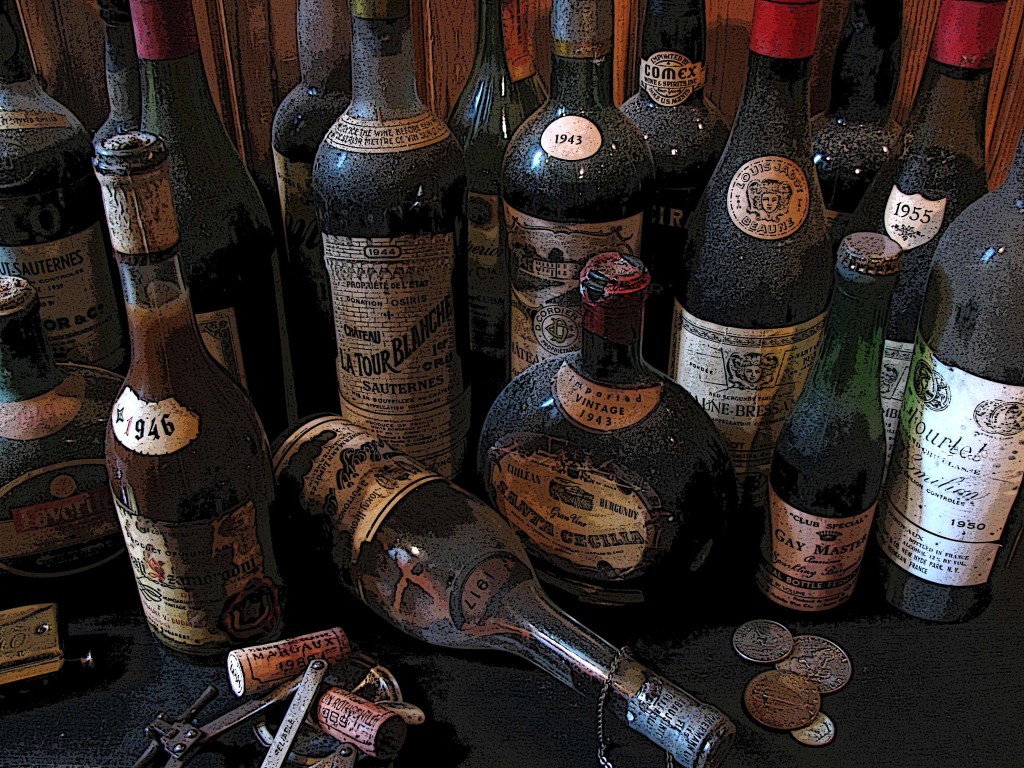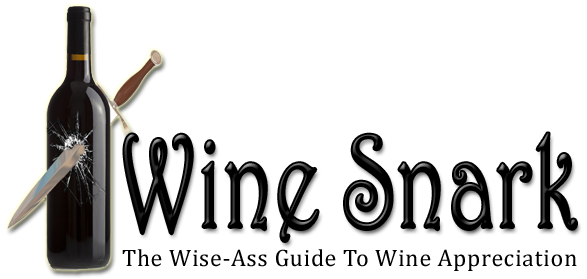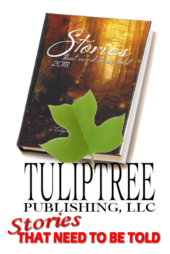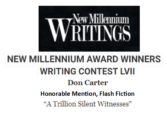Loving Wine, In Spite of Itself.
Look, I know the drill. I’ve been there myself. You’re in a wine store reading those little signs in front of each wine when you start to feel out of place, kind of like one of those Duck Dynasty guys who mistakenly wandered into a gay pride parade.
Shelf talkers, as they’re known in the trade, tout the virtues of the wine at hand and usually contain a wine review from a magazine or newspaper. As you read something like, “this wine displays aromas of galangal root caressed by nuances of Louisiana road tar,” you find yourself thinking, “I never smell and taste these things in my wine and what the heck is galangal root anyway?”
So I’d like to start by correcting a common misconception caused by these shelf talker wine reviews. No one slipped cat pee into your Sauvignon Blanc or horse manure into your Burgundy. They smell that way on purpose.
Really.
Most wine consumers appreciate the tasting notes or wine reviews on shelf talkers, but those less versed in wine terminology may look down at a shelf talker and get the uneasy feeling that the shelf talker is actually looking down on them.
I’ve seen the expression a thousand times. Someone stops to read a shelf talker and their stare soon glazes over. “Shelf-Talker Stupor” may be the leading cause of beer drinking in America. Symptoms include a dazed, confused look as victims try to decipher the shelf talker wine jargon. Eventually they throw up their hands and decide it’s Miller time.
Of course condescending wine jargon isn’t confined to the retail environment. Sommelier intimidation is also a long-standing American tradition just like mud wrestling or the never ending salad bar. Perhaps this has happened to you. The sommelier pours a sample of the wine you ordered and asks, “How do you find the wine?”
You reply, “Why’re you asking me how to find the wine? Why don’t you look in the wine cellar?”
“No sir, I mean what do you think of the wine in your glass?”
You look at the sample in your glass and say, “I think that’s a pretty small pour. Why don’t you give me a full glass, I’m gonna pay for it.”
The waiter rolls his eyes, fills your glass and asks, “Will you be requiring club soda in your wine tonight sir?”
Before I learned about wine, I tried to avoid embarrassing scenes like these by quickly handing the wine list to my wife when the wine steward approached. One crafty sommelier put me on the spot anyway when he snidely asked, “Will your wife be ordering the wine this evening sir?”
“She’ll have whatever I’m drinking.” I said with authority.
“And what will you be drinking tonight?”
“I don’t know,” I sniffed. “She hasn’t told me yet.”
Scenes like this discourage many would be wine aficionados but despite the wine industry’s best efforts, people still drink wine. What is it about wine that keeps people coming back for more despite the intimidation and haughty nomenclature? Mountain Dew doesn’t make you laugh and cry or move you to photocopy your keister at the office Christmas party. Critics don’t rate tea on a 100-point scale and Starbucks doesn’t age its coffee in a musty cellar for years. It only tastes that way.
One of the great mysteries of wine is its chameleon-like ability to taste like so many things other than the grapes from which it came. Wine can be made from any number of fruits, but wines made from other fruits lack the variety of flavors found in grape wine. It’s as if this schizophrenic little cluster of fruit has multiple personalities.
Do you remember when you were young and shared a bottle of apple wine with your friends? Did anyone rave about the complexity of the wine between retches? Probably not, because wines made from apples only taste and smell like apples (going down and coming back up). The same holds true for wines made from raspberries, cherries, blueberries and all the other fruits under the sun, all that is, except grapes.
Wines made from grapes sometimes display aromas and flavors of grapes, but the characteristics are more likely to resemble apples, pears, blackberries or cherries. Wine might also remind you of Darjeeling tea, smoked meat or hazelnuts. Grapes are like the Dame Edna of the wine world, they are great fruit impersonators.
Wine affects people differently because, unlike most beverages, it strikes an emotional chord in your psyche. When your brain memorizes an aroma, the memory gets entangled in the part of the brain that manages your emotions.
Perhaps you’ve experienced a warm, glowing feeling when aromas of cinnamon or vanilla remind you of your grandmother’s kitchen. I could be way off base here. Your grandmother’s kitchen may have smelled like cheap gin and cigarettes. I tend to get a little misty-eyed when I walk into a cheesy gin mill because it always reminds me of Grandma’s peanut butter and Beefeater cupcakes.
When you perceive a familiar aroma in wine, one that tugs at your heartstrings, it may have a subliminal effect on whether you like or dislike that wine. The smoky aroma in a glass of Rioja may remind you of the time you set the kitchen on fire (I swear it was an accident). A sudden whiff of honeysuckle blossom in a glass of Chardonnay may remind you of your first kiss on the front porch swing. The oily, petroleum-like aromas of some Rieslings remind me of my first kiss. That’s the smell that permeated the back seat of my ‘67 Chevy Belair.
This bond between the sense of smell and the emotions may present a dichotomy when attempting to describe wine. I often approach wine analysis from an analytical, intellectual perspective but wine has a funny way of changing my approach midstream. I may begin with impersonal, scientific observations but as I find less wine in the bottle, I find more adjectives on the page. This may explain why I spend hours every morning deleting adjectives.
Complex flavors and aromas go a long way in explaining our centuries-old love affair with wine, but I think there is something deeper to its appeal. There is one aspect of wine that rarely gets mentioned in wine magazines, books, or shelf talkers, yet is so important that it inspired an amendment to the United States constitution.
I speak of course, of wines intoxicating capabilities. Wine journalism needs to drop the pretense and acknowledge the existence of alcohol in wine. Just once, I’d like to read a wine review that said, “This wine tasted pretty average, but I got hammered and danced Gangnam style ‘til dawn!”
Long ago man discovered that grape juice, when exposed to yeast, ferments into alcohol. Now let me hear you say hallelujah brothers and sisters because to my mind the discovery of fermentation ranks right up there with the wheel, the lever, and the Wonderbra.
Alcohol stimulates the accumbens nucleus, which is the part of your brain responsible for pleasure, laughter, aggression and fear, or as I like to call it, a typical weekend with the in-laws.
Alcohol also triggers the reward system in your brain, so you feel good about your abnormally rowdy behavior, even if you wouldn’t typically perform a strip tease at your niece’s Bat Mitzvah. It’s the component that makes people boisterous, sometimes even causing them to swear. I usually wake up in the morning and swear to never drink again. Alcohol is also known to affect your memory, which may explain why I occasionally repeat myself. Alcohol is also known to affect your memory, which may explain why I occasionally repeat myself. You don’t have to be a scientist to know that alcohol acts as a depressant on the brain’s higher functioning. Anyone can attest to that fact after watching just one evening of reality television.
Let’s piece this puzzle together to get a sense of why this beloved beverage keeps you coming back for more. Wine offers wonderfully complex flavors and aromas that are intricately entangled with your emotions. Wine also has texture which feels good in your mouth. Ultimately however, the allure of wine is not how it tastes, smells or feels but rather, how it makes you feel. Jack Lemmon once summed up wines broad appeal when he said, “I feel sorry for people who don’t drink. They wake up in the morning and that’s the best they are going to feel all day.”
Technically wine may be nothing more than fermented grape juice but to those of you who embrace its numinous qualities, wine is so much more. Wine is a part of your way of life and helps mark the milestones of your existence. You share wine in times of celebration, like anniversaries, birthdays, or sleeping through the night without waking up to pee. Wine is there to comfort you in times of sorrow such as funerals, divorces or having to watch Mamma Mia one more time with your wife. And of course wine is an integral part of your religious celebrations like Christmas, Passover, and Super Bowl Sunday. In fact many people claim wine is like a religious experience because, much like sitting in church, it can make you drowsy.
Wine is a thread that ties you to your family and friends and binds you to your past as well as your future. Do you remember that special bottle of 1961 Chateau Lafite Rothschild your father shared with you on your 21st birthday? Yeah, neither do I, but when my first son was born, I bought a mixed case of Premier Cru Bordeaux in his honor and lay it quietly away for two decades. When my son turned 21, I opened the first bottle from that case. Together we shared a bottle of 1989 Chateau Lafite Rothschild, toasting his birth and his growing appreciation of fine wine. He then went out and bought a six-pack of pomegranate-flavored malt liquor.
I love wine for all these reasons and more. Wine is an organic, ever-evolving work in progress that continuously changes as it ages in the cellar or breathes in a glass. Like the pencil marks inside the pantry door that mark my sons growth, tasting wine on any given day is nothing more than a snapshot of that wine at one moment in its evolution.
It fascinates me that grapes grown in flinty soil can smell like gunpowder and wine aged in American oak can taste like dill. I’m amazed that the resolute roots of a grape vine can squeeze through hairpin cracks in a solid rock cliff, seeking moisture one hundred feet underground. I marvel at the wine blenders skill and the barrel coopers craftsmanship. And naturally I love the wine trade and my missionary role as a wine writer. These are but a few of the reasons we drink wine in spite of itself. In short, wine gives my life meaning; it’s the reason I climb out of bed every afternoon.























